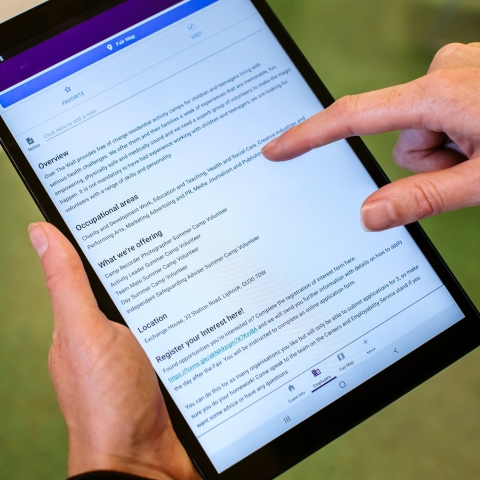
Many students choose to take up part-time work alongside their studies. When your job is well balanced alongside your university work, a part-time role is a great opportunity to earn extra cash while building a valuable skillset and gaining good experience for your CV.
Typical part-time job roles in Portsmouth
Although you may come to university with experience of working in a professional role, it might be difficult to find part-time work that directly relates to your studies.
When it comes to the types of roles available alongside your studies, you’re likely to find jobs such as:
- Administration Assistant
- Cleaner
- Games Tester
- IT Support
- Lifeguard
- Private Tutor
- Retail Sales Assistant
- Student Ambassador
- Student Development Assistant
- Student Information Assistant - Careers & Employability
- Temp staff
- Tour Guide
- Transcriptionist
- Waiting staff
Find a part-time job
Before you start your job search we recommend that you wait until you have your timetable to see when you will be able to work.
There are a few key ways to find part-time work in Portsmouth:
- Browsing our MyCareer Jobs Board
- Searching online job boards
- Speaking to local businesses
- Exploring part-time roles at the University
1. MyCareer Jobs Board
MyCareer is the University's online career platform where you can book upcoming events, read industry reports and browse our jobs board. As well as part-time roles, our job board also advertises graduate jobs, volunteering roles and internships.
Our team reviews and uploads all suitable job opportunities to MyCareer so you will find roles at the university, students' union and around the city.
Browse part-time jobs on MyCareer
2. Searching online
We also recommend searching other online job boards such as:
3. Speaking to local businesses
Speaking directly to a business - either in person or through email - is called a speculative application. This is a great way to find part-time work locally. There are lots of areas to find work in Portsmouth including:
- Gunwharf Quays
- Commercial Road
- Southsea - Albert Road, Marmion Road, Palmeston Road areas
4. Exploring part-time roles at the University
At the University, we offer many part-time roles each year including:
-
Student Ambassador - Follow the link to find out more and register your interest
-
Student Information Assistant - Careers & Employability
-
Residence Life Assistant
-
Telephone Interviewer
-
International Student Ambassador
-
Exchanges and Study Abroad Ambassador
-
Confirmation and Clearing Assistant
-
Student Marketing Assistants
Find the latest university roles through MyCareer.
If you need further support with your part-time job search, drop-in to the Careers Centre during term-time on weekdays between 1.00pm-4.00pm and speak to our Student Advice Team.
Are you an International Student?
You will need a National Insurance number to work in the UK. It can take up to 4 weeks to get your National Insurance number so you should apply as soon as you start searching for part-time work.
Apply for a part-time job
There are several different ways you may need to apply for a part-time job, depending on the role you're interested in. However, there are key tools you can build to ensure you are ready for any part-time application.
Part-time CVs
Having a CV that showcases the skills you have developed through studying and from previous experience, helps to make you an attractive prospect for a potential employer.
- You should make sure your CV is targeted to part-time work
- Have a look at generic job descriptions to identify the skills required for the role
- It can also be helpful to include your availability in your profile

Other key tools for applying to part-time roles include:
Cover letters

Application forms

Speculative applications

Tailoring your application
You must tailor your application to each role you are applying to:
- Find out more about the company, including what they do and what they look for when recruiting
- You should read the job description thoroughly to identify the skills that are required for the role
- You should emphasise how you possess/have developed these skills, with examples, in your cover letter and CV, or in the application form
Find out more about researching employers
Job scams
Unfortunately, some job roles may be scams. Scammers may expose you to financial loss and make your job hunting even more difficult.
Here are some typical signs to look out for from job scams:
Personal email addresses should raise red flags - for example joebloggs@outlook.com or 12345jane@email.net
-
Legitimate hiring managers will have a company or business email address!
-
You can also search LinkedIn for the recruiter. You will be able to check that the company exists, and also see whether they are a genuine contact for the company. However, you should still follow our other advice to confirm the contact/company is legitimate.
Be wary of employers who ask you to contact them on WhatsApp. Usually a company will have information of the job role and the application process on a legitimate website.
If it’s hard for you to find a company website, or you can’t find a website at all, this is a strong indication that the job may be a scam! Check to see if the company has a website or any social media profiles, such as Twitter or LinkedIn.
-
You can check Google, as well as different social media sites to see whether a company has an online presence.
-
You can also get more information on a company, for example their registered address, on the Gov.UK website.
Be wary when you see a job advertised on social media like Facebook, as it may be a fake job posted by potential scammers hoping to secure your financial information.
For example, if an opportunity is claiming that you could make £60,000 a year, £234-£457/day or if they advertise a “flexible income”, this may potentially be a scam. Be careful if:
-
The advertisement heavily focuses on the amount of money you could be making
-
If a role is offering a high salary with no experience required
Legitimate roles will inform you of the salary and benefits, but not solely focus on these. They will also outline the skills and experience required for the role.
One minute you send off your CV, the next minute you have a job offer! This is indicative of a scam job.
-
A legitimate recruiter will take a few days, even up to a couple of weeks, to get back to you after applying for a job.
-
A formal interview should also take place before you are offered a job.
There should be a few stages that you go through before you are offered a job!
As an employee in the UK you have extensive rights to protect you at work. In the UK there have been cases of 'labour exploitation' where employers treat workers in an unfair way. Learn about your rights and if you are concerned about your working conditions please get in touch with us at the Careers and Employability Service.
Protecting yourself against job scams
Job scams are on the rise for students, but don't panic - we've got a handy list of red flags to look out for! At Portsmouth there's a wealth of support available to you if you're looking for a placement, part-time work or volunteering.
0:00
I would say that scams are becoming more and more common.
0:04
Recently, there's this scam job thing going around on WhatsApp where you get a
0:08
message from someone that you haven't had their number before,
0:11
and they're offering you a position somewhere and they want more information and they're, like, introducing themselves as a recruiter
0:17
and when you've got lots and lots of jobs that you're applying for you might not have remembered who you've given your number to.
0:31
I would say students and recent graduates are really vulnerable, especially when you're looking for part-time work.
0:36
I know that a lot of students are living within a budget, a very strict budget.
0:41
You're doing so many applications, they're not very specific, you're giving out a lot of details.
0:47
The red flags that you should look out for are where they're promising a lot of money for a little work.
0:53
We're looking for grammatical errors.
0:56
Yeah you've just received an email and it's like 'we've got a job opportunity for you, click this link,' and there's no body of text.
1:02
It's just like it's automated.
1:04
If you're looking at an advertisement online and it has links, don't click on those links until they can be verified.
1:10
Verify the details before you pass over any of your personal details and the biggest one is to never, ever give your bank details.
1:21
If you have been a victim of a fraud or you believe you've been a victim of a scam, you can report it in a number of ways.
1:28
You can go online to Action Fraud report it directly.
1:32
You can contact any person in the university and they can forward your details on.
1:37
You can find more information on the university's MyPort page under security.
1:43
Come in the Careers and Employability Office
1:45
and find out about the jobs that you think you've found that you're interested in and get them checked over.
1:51
Probably the best site to apply for a job for if you're a University of Portsmouth graduate or student is probably
1:56
MyCareer because MyCareer does vet all of their current job postings.
2:01
You know that these are genuine jobs and you know that it's safe.
2:05
MyCareer is great because you can find out lots of information about the jobs that you're interested in.
2:10
You can create searches so that you can keep in mind what jobs you're applying to.
2:14
If you've got a CV or cover letter you're not sure about and you want reviewed,
2:17
come to our drop-in one till four, every day of the week, Monday to Friday.
2:23
It is really, really easy to be tricked into thinking that something's legit when it's not.
2:29
We all say if it's too good to be true, it is too good to be true.
2:32
Be suspicious, ask questions, just don't take anything at face value and that way you will always be protected against this type of crime.
Some key tips to keep yourself safe:
- Be careful of fake jobs put out by scammers
- Don’t give out bank information without receiving a formal offer
- You should never have to give out money or take on expenses to get a job
- Do some research into the employer to see if you can find out more information
- If it feels wrong, ask for support from the Careers & Employability Service
Important information for International Students
If you want to work in the UK during your studies, you need to check your visa regulations.
Working hours
Most Visa students can work 20 hours per week in term time. Whether you are in paid work, or volunteer for free, ALL of the hours count. For example:
- 10 hours paid + 10 hours volunteered
- 20 hours paid
- 20 hours volunteered
- 12 hours paid + 8 hours volunteered
For information on your term time and vacation working restrictions, visit Working during your studies.
When you start your job search
- Be ready to prove your "Right to work" - your employer will ask for your passport or your Share Code to check your Visa working restrictions
- Apply for a National Insurance Number - it can take up to 4 weeks for your National Insurance Number to arrive after you apply. You can start work before it arrives.

Visit our International Student Career Guide
If you are studying with a Visa, we can support your ambitions, whether that be finding experience opportunities whilst you study or looking for work in the UK after you graduate. Visit our International Student Career Guide to learn more about the opportunities available to you in the UK.
Need further advice and support with managing money?
Speak to our Student Money team who can provide information, advice and support to help keep your finances on track. From budgeting better to finding finance, the team includes trained money advice experts who will always put your needs and interests first.
Enable University alerts
Turn on notifications for critical updates like closures, safety alerts, and urgent service disruptions.













